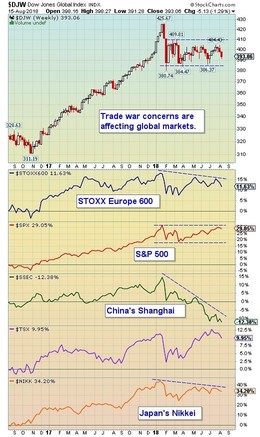August 15, 2018: Market Minute: The affects of a trade war on global marketsSince the start of the trade war, world markets have been holding their breaths with the hope that this 'spat' would be short-lived. The outlook now is that it will drag into early Q4. It started with a sharp market run-up in January. And by early February, the runaway stock market ran smack into spiking bond rates. Investors suddenly became worried about the economy, concerns that the huge tax cuts, could cause the economy to overheat and force the Federal Reserve to raise interest rates. In response, global markets, on average, dropped back about 10%. As a slow market recovery took hold early Q3, another blow was about to hit the markets. The US-China trade war. The first round of US tariffs against China started in March and were immediately matched by Beijing toward the US. Additional US tariffs followed in April, May, June and July, and with each new charge, an equal response would come back from China. The first market casualty came from China's Shanghai. The index steadily declined from Q1 and is now down almost 19%. European markets started to stumble next. Currently down over 11% ytd. Japan's Nikkei was soon to weaken. From reaching a new all-time high in Q1, the index has fallen 11% and remains in a tight consolidation over the last six months. The US, with its strong economy and record low unemployment, their market (S&P 500) only flatten. From a world perspective, the trade war between the two biggest economies, has caused the Dow Jones Global Index to stall and appears set to retest the lower level (385) of the range. Bottom line: The ramifications of the trade war appears to have impacted the upward trend for most world markets. Though China's Shanghai has suffered the most with almost 19% shed since early 2018, there is no market that has been left unscathed. Models suggest that if the benchmark Dow Jones Global Index breaks below 385 in the weeks to come, 375 would be the next lower support level. |

|
|
|
|
D.W. Dony and Associates
4973 Old West Saanich Rd.
Victoria, BC
V9E 2B2
|
